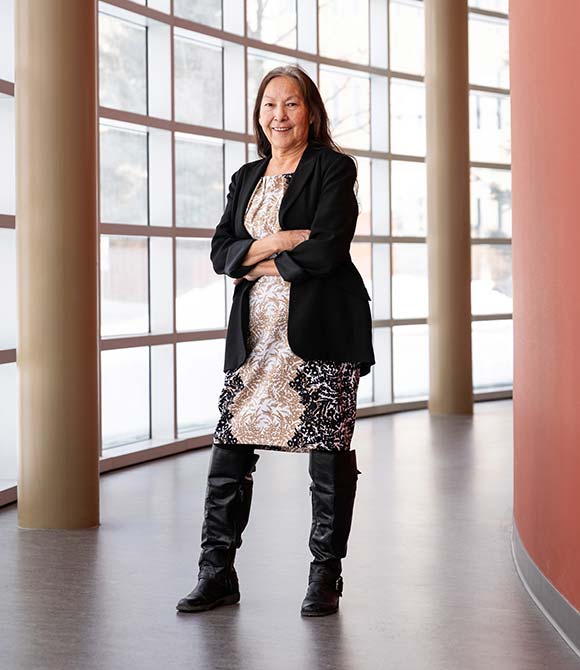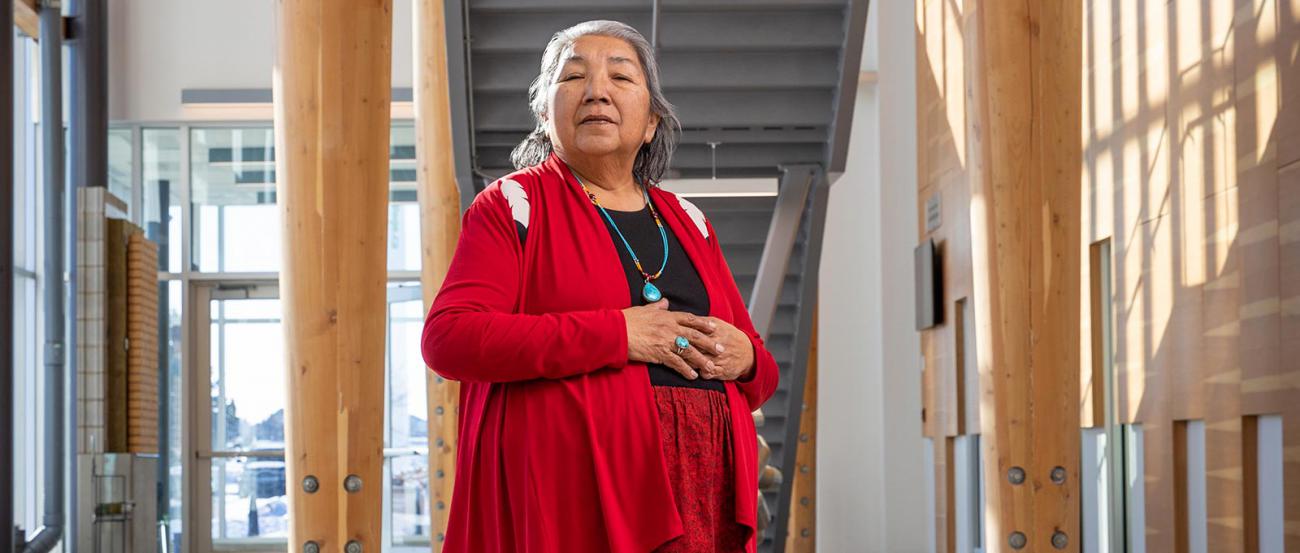Read more from our archives: previous stories on Inspriing Indigenous Women are available here.
Stories by Marcia Black Water, Lowa Crowshoe-Beebe, Rachel CrowSpreadingWings, Joyce Healy, Beverly Hungry Wolf, Jean Philistine Old Shoes-Maurer, Tawyna Plain Eagle, Candace Coby Royal, Kimmy Shade, Roberta Smallbones, Janetta Soup, Nikki Soup and Roxy Weasel Head.
For more than six decades, Lethbridge College has been an important waypoint in the life journeys of tens of thousands of people. Whether they came to study, to work, to teach or to support others, their time in these classrooms and corridors shaped and steered them in a variety of exciting and enduring ways.
For many of the Indigenous women who have spent a semester, a year, a decade or more at the recently named Ohkotoki’aahkkoiyiiniimaan, or Stone Pipe, the journey to Lethbridge College was made possible through the support and guidance of their mothers, grandmothers and other women in their lives.
Beverly Hungry Wolf (Honorary Bachelor of Applied Arts 2011), one of the first people from the Blood Reserve to attend Lethbridge College in the 1960s, says “one of the reasons I feel so confident is because I have all the grandmothers holding me up. All the knowledge that my grandmothers gave me – I believe in that knowledge. I know that it worked for thousands of years for them, and it can still work in this day and age.”
In the following pages, we invite you to read the stories of Indigenous women connected to Lethbridge College who have led the way and inspired those around them in their lives and work. They are a small sampling of the many inspiring Indigenous women who are part of the Lethbridge College community and who carry the wisdom and walk in the ways of their mothers and grandmothers.
Marcia Black Water
IITO’TAWAOHKAAKII - WALKING BESIDE
Marcia Black Water is a member of the Kainai First Nation, which is part of the Blackfoot Confederacy. She graduated from the General Studies program at Lethbridge College in 2004 and earned a Bachelor of Arts from the University of Lethbridge in 2009. She now works as the coordinator of Indigenous Services at the college.
I was in Thunder Bay a couple years ago and listened to an early 20-something young woman share her experience as an Indigenous student. She told the story of the success, the struggle and her will to keep going. It was a familiar story that she summed up eloquently: “I go to college to honour my family. My grandmother did not have the opportunity I have. I feel as though I am carrying my grandma along with me.”
I carry my mother and grandmothers with me, everywhere I go. They came with me several years ago when, for the first time, I travelled alone for my work at Lethbridge College. I would be getting to the airport alone and be far up in the Canadian north in the middle of winter alone. It was my first speaking engagement for the college and in all honesty, it was as nerve-wracking as a whiteout winter road.
While it was an empowering moment for me as a Blackfoot woman to be asked to present at a prestigious conference, even still, a few days before I left I was on the phone in tears with my mother. I was relating to her a news story I read about the history of assaults on women by taxi cab drivers in the Yukon. With all the media coverage on murdered and missing Indigenous women in Canada, I was worried about travelling alone. To ease my worry, I decided to rent a car. It might sound like a strange thing to worry about; however, as Indigenous women, we think about such dangers. My mother found the positive response to my worry: “You like travelling! Just enjoy yourself. Rent a car. Don’t worry. My prayers are with you even when I am not.”
Despite the historical reality of the lives and moments in time where we did not seem to matter, Indigenous people in Canada have endured and persevered. I have been fortunate to live with an upbringing guided by my cultural Blackfoot ways of life, Niipaitapiiyssini, wherein life always matters.
The learning of my Blackfoot ways began as far back as I can remember. The earliest memories are songs and stories shared by my mother Delores, Aapaisaapiiaakii; they were the same as ones my mother’s grandmother Aahkiaapikkitstaakii (Annie Mountain Horse) shared with her. The song my mother would hum to my sister and me is a song that remains in my memory.
When I was four years old, my mother and her sister Alvine joined the Maotokiiks (Buffalo Women's Society). This moment began a life in which, as my mother said to me, “We will walk in this world differently; it is a blessed and honoured life.” My mother wore the same sacred headdress as her grandma.
My mother danced many dances in her life and guided me through mine. As I reached adulthood, I realized how protected I was in the space my mother created for me. She ensured I knew she would support me in whatever it was I ventured to do, including getting an education. “You need to get your education,” she said. “I never finished college, but you go to university. You are different, Marc, and you do not have anything to worry about.”
When I graduated from college, I was the mother of three beautiful children and they, along with my supportive, loving husband, my amazing parents and my siblings, watched me cross the stage. As I began walking out of the gym, I heard a voice calling, “Mom, wait for me!” I turned and there were my little children running through the river of blue gowns toward me. I took their hands and walked with them.
That moment was pivotal for me. I realized my journey was different than my mother’s, than my grandmothers’. I was getting a choice of what education would be for me as a Blackfoot woman. In my walk through my life, I am always carrying my mother’s and my grandmothers’ love and prayers along with me.
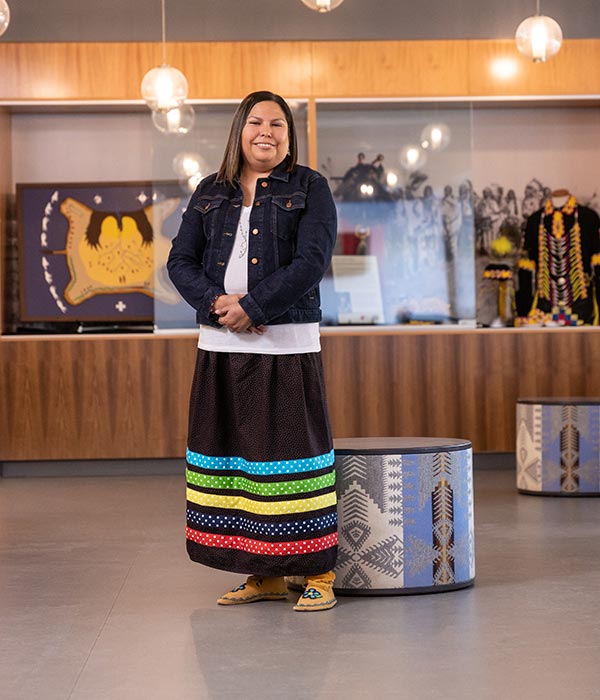
Candace Coby Royal
KSISKINIIKAKATOSAKI – MORNING STAR WOMAN
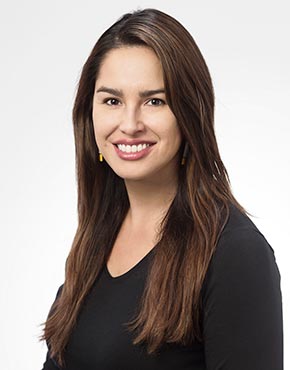 Candace coby royal is a member of the Kainai First Nation (Blood Tribe), which is part of the Blackfoot Confederacy. She has worked in a variety of advocacy roles in Alberta and is now launching her own consulting business. She graduated from the General Studies program at Lethbridge College in 2004.
Candace coby royal is a member of the Kainai First Nation (Blood Tribe), which is part of the Blackfoot Confederacy. She has worked in a variety of advocacy roles in Alberta and is now launching her own consulting business. She graduated from the General Studies program at Lethbridge College in 2004.
Oki, Niistohaniikok Ksiskiniikakatosaki. Hello, I am called Morning Star woman. The literal translation of my Blackfoot name means I am the first to see the morning star. My name is also Coby Royal. I have been able to overcome many obstacles with the support of my family. My parents are Alphonse and Nora Eagle Bear.
I became a young parent at the age of 15. This is not to say I was raised poorly or that my parents didn’t care about me – it was the opposite. My parents spoiled me with love, kindness and patience. I am very grateful for when I look back, my life experiences made me who I am today. I am a proud Blackfoot woman.
What I remember most growing up was how the community was always talking about post-secondary education. I understand now that they were talking about education being the new buffalo. At 15, I registered myself into a homeschooling program through an alternative school, and at the age of 17, I graduated from high school. At that time, I moved into low-income housing in Lethbridge and started attending the college.
After graduation, I earned a BA from the University of Lethbridge. I also had my son while I was attending university. My purpose in life was to provide for my children and give them a good life. My work ethic developed at a young age and came from my father, mother and grandmother. I learned to be kind and patient from my parents who took care of my grandmother Gwen Healy and my two handicapped uncles. Today, I work as an advocate for men, women and children within the First Nations communities I serve.
If there is any advice I could give to students at the college, it is that everyone needs a purpose in life, a reason to wake up. Set goals and find out what motivates, inspires and drives you. Obtaining a post-secondary education is hard work and there are supports to help students. Graduation – or convocation – is one of the most gratifying experiences you’ll have in life.
Tawnya Plain Eagle
SA’ CII NAKI
Tawnya Plain Eagle is a member of the Piikani Nation, which is part of the Blackfoot Confederacy. She graduated from the college’s Digital Communications and Media program in 2016 and is expected to receive her Bachelor of Communications degree from Mount Royal University this spring. She is also an editor of Piikani Nation News.
I love being able to tell a story, whether that is my own story or not. Being a Blackfoot person and seeing how some of our stories get misinterpreted or looked over in the media has inspired me to continue sharing our own stories through film, writing, photography and beyond. When I complete a story and it is received well by my community, I know that I am doing the right thing. We haven't always been in charge of our own narration and it is time we as Indigenous people take a lead on that.
I like writing Indigenous stories that have a political twist. In the last municipal election, I wrote one titled "Reconciliation is more than saying sorry." It looked at how the City of Calgary can address truth and reconciliation better than they have been in the past. I also wrote a story about an Indigenous model that was helping youth break out of their shell and work with their low self-esteem through fashion shows.
I also wrote another story titled "The Empty City: Life between two worlds." It was a self-reflection of my own life growing up in Calgary and constantly visiting the reserve. I incorporated how my mom, who was a single mother, had to do what she needed to do to give me the best life possible. Through that, I mentioned the Indian Act and the barriers it places on Indigenous reserves when creating jobs.
To this day, I'll still get random people who will message me on social media and email that say they've read my story and how inspired or moved they were by it. One girl emailed me and told me that I have a gift for writing from my heart then applauded my mom for the sacrifices she made. She also wrote that my writing "will help build a bridge of understanding between the two worlds." This is what I strive to do with anything that I write that has an Indigenous focus.
We haven’t always been in charge of our own narration and it is time we as Indigenous people take a lead on that.
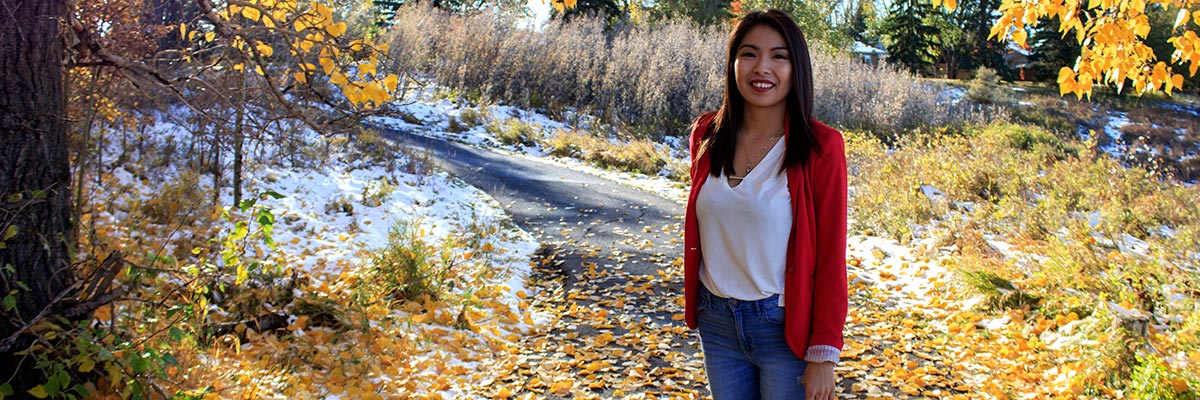
Beverly Hungry Wolf
SIKSKA-GHEE – BLACK-FACED WOMAN
Beverly Hungry Wolf is a member of the Kainai First Nation, which is part of the Blackfoot Confederacy. She is an author, activist, educator, elder and lifelong Southern Albertan who has dedicated herself to learning and restoring her Blackfoot culture for future generations. She was one of the first people from the Blood Reserve to attend Lethbridge College, and, in 2011, she received an honorary degree from the college.
I am working on two new writing projects now. The book I am most happy about is The Ways of my Grandmothers, which was finished in 1980, the Year of the Woman. Later, I did another book, Daughters of the Buffalo Women. This is about women in my mother’s time – when the tradition went from being at home all the time to going to residential school. I am hoping that when I retire I can do another book called Sweet Grass, or The Women who Walk in Two Worlds. It would be about my own experience – about girls and women who went back to our traditional culture and helped to revive it.
It seems my life work is to share the positive stories about native women, because they’ve always been marginalized since the coming of the settlers. I’ve always considered my work to make non-natives understand about our ways. Our ways are very intricate. As a woman, I would love to be living in the old days, I would have all kinds of people looking out for me, and here, in this lifestyle, I sometimes feel scared because of the people. I am not scared to be out in the woods but sometimes I am scared to be in the city.
In the old days, the men would ask the women, “OK, what do we need?” Our ways were different. In our culture, most of the holy things, the ceremonies, they are given to the women and shared with the men. We are the knowledge keepers. We keep the bundle. We take care of it. Our husbands, they run the ceremony because that’s what we want them to do. But the most holy things, the ceremonies, they were given to the women and shared with the men. Our husbands always deferred to us and they asked, when we had our meetings, the women got asked first, the men would say, well, we will follow, because the women knew what our tribe needed, what our family needed, what our children needed.
With the coming of the settlers, but especially the church, our culture became very paternalistic. It feels like for thousands of years there was a really nice balance, and they disturbed that balance. Things that worked for us for thousands of years – suddenly we were to believe something from someone who came here 150 years ago. And we were forced to believe because the non-natives had the bigger guns.
[Despite the challenges,] you keep hope by believing in the Creator. If you believe in the Creator, you know that there is a path set out for you. I never knew I would be on this path, but everything was just falling in place for me. I had a wish to learn about my culture, and everything fell in place. And I was very, very fortunate that the last of our old people were still around, and those were my teachers. They taught me how they were taught – you only get told something once and you’d better remember it. That was our learning style.
If you believe in the Creator, you will find that right path. You might get a few bonks on the head but eventually it will work through. It is the same with dying. It doesn’t matter who you are. You are going to die sooner or later. I am not going to have any fear of dying. I’ve tried to be kind and tried to follow what my traditional people taught me, which is basically do unto others.
One of the reasons I feel so confident is because I have all of the grandmothers holding me up. I have all the knowledge that the grandmothers gave me, and I believe in that knowledge. I know that it worked for thousands of year for them, and it could still work in this day and age. My grandmothers told me: “This is how you do things. This is what life is about. Whatever you do, always remember it will come back to you.”
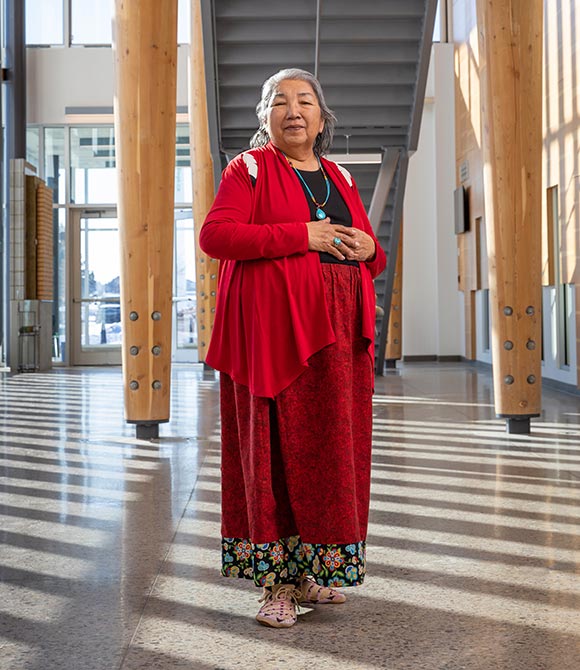
Lowa Crowshoe-Beebe
NATOYI’SOKASIIM
Lowa Crowshoe-Beebe is a proud member of the Piikani Nation, which is part of the Blackfoot Confederacy. She graduated in 1996 from Lethbridge College’s Information Specialist program and now works in public relations, advocacy, media, social media and communications.
While I was a student at Lethbridge College, I won the Charles S. Noble Award for leadership, from the Government of Alberta. I was president of the First Nations club, which at that time was the largest club at the college, and we were very active that year. We did many things as a club that I was proud of. That next year, I ran for students’ association and lost by one vote.
After I graduated in 1996, I moved to Calgary and worked for Xerox Canada and then moved to Telus Communications. I had an amazing 11-year career there, working in communications, consumer and corporate sales and mobility. I left in 2007 with social media taking off on the internet, I joined the new era. I understood the purpose of social media to connect people, I understood the reach of it, and I am amazed what it’s brought into my life. Today, my social media reaches hundreds of thousands of people a month and engages First Nations and non-First Nations people alike.
I take pride in my Blackfoot heritage and thank my grandparents who forged the way for me and showed resilience in their efforts. My grandfather, Howard Beebe Sr., was a founding member of the Indian Association in 1939, an organization that changed many laws for our people in this country. My other grandfather, Joe Crowshoe Sr., won the Order of Canada for his cross-cultural work in bridging the gap with Canadians.
My most recent accomplishment came this year. I ran for Piikani Nation Chief and lost by a few votes. I am proud of my accomplishments and will continue to work to advocate for my people and change people's perception about who we really are.
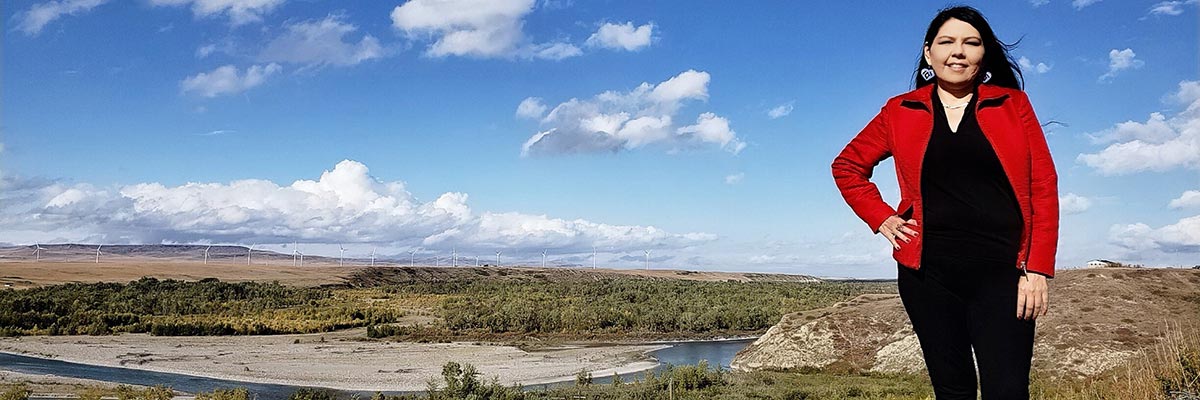
Jean Philistine Old Shoes-Maurer
AAKAI’PO’TAKII – MANY FLYING WOMAN
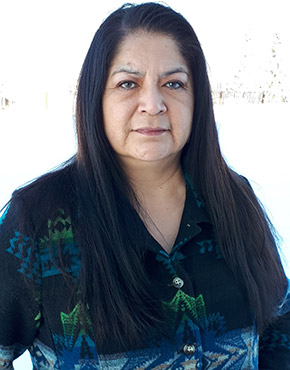 Jean Philistine Old Shoes-Maurer is a member of the Blood Tribe, which is part of the Blackfoot Confederacy. She graduated from the college’s Criminal Justice program in 1998 and went on to earn a Bachelor of Professional Arts – Criminal Justice degree from Athabasca University. She is one of the co-founders of Apiistamiiks, White Buffalo Trail Blazers, a grassroots organization dedicated to giving a voice to those who feel they cannot speak up for themselves and bringing an end to racist and discriminatory acts.
Jean Philistine Old Shoes-Maurer is a member of the Blood Tribe, which is part of the Blackfoot Confederacy. She graduated from the college’s Criminal Justice program in 1998 and went on to earn a Bachelor of Professional Arts – Criminal Justice degree from Athabasca University. She is one of the co-founders of Apiistamiiks, White Buffalo Trail Blazers, a grassroots organization dedicated to giving a voice to those who feel they cannot speak up for themselves and bringing an end to racist and discriminatory acts.
I was working on my Indigenous Bachelor of Social Work at Red Crow College at the end of our first year, in 2018. Instead of doing a practicum, myself and two fellow students - Nadine Eagle Child and Melodie Bastien – chose to do a group project. We wanted to see if we could create an advocacy group that would address and bring awareness about discrimination to Lethbridge and southern Alberta. We came up with our group – Apiistamiiks, White Buffalo Trail Blazers – to address racism and discrimination.
Our Blackfoot people have been affected by colonization and are afraid to speak up. Our advocacy group is speaking up for our people, who may not be familiar with the Canadian Charter of Rights and Freedoms or know about racial profiling or systemic racism. We want to be a safe space where people can come out and tell their stories and get help speaking up. Now that the government has acknowledged what has happened with residential schools and is working toward reconciliation, we can help people start healing.
This is one way I can give back to my community and my people, and to help them through this process. The three of us are all educated, and we have life experiences that have made it so we’ve been able to stand up for ourselves. We also understand our Blackfoot traditional ways of life (Niitisitapiiysinni).
I am very fortunate to have been raised with two grandfathers, Mark Old Shoes and Pete Weasel Moccasin, who were very prominent spiritual Elders in our community. My parents, Joyce and the late Percy Old Shoes, instilled strong ethics, morals and values throughout my upbringing. My mother was my first role model. She would encourage me and lift me up and tell me life is going to be hard at times, but don’t ever give up. There’s a Blackfoot word – iik-ak-imat – that means try hard. Our parents and grandparents would tell us that.
My aunt Loretta Many Bears and my sister Sylvia Old Shoes were also role models. They were the first two people in our family to get a degree. I feel like they are the ones who started the path of academics for myself. When my aunt and sister went to school and were successful, I saw that if they could do it, I could do it too.
Rachel Crowspreadingwings
NAATOIIKIIMAKII – HOLYFEATHER WOMAN
Rachel Crowspreadingwings is a member of the Kainai First Nation, which is part of the Blackfoot Confederacy. She graduated from the communication arts program at Lethbridge College in 2015 and currently works as a video journalist and host of Citynews in Winnipeg.
Before I attended Lethbridge College, I produced my own television show that aired for over a year and a half on Shaw-Lethbridge. It was called Prairie Phyre First Nations News in Southern Alberta and its mission was to raise awareness in the mainstream culture about First Nations communities. With the encouragement of my producer at Shaw, I returned to postsecondary and attended Lethbridge College. For the next three years, I was a full-time single parent and student.
After I graduated in 2015, I did contract work for two-and-a-half years as a weekend anchor, reporter and producer for ABC/FOX Montana. I was the only Indigenous reporter working in the mainstream media in Montana. In October 2018, I started working as a video journalist at CityNews in Winnipeg – where I was one of three Indigenous reporters in Canada working for CityNews. Now I am working at CTV Winnipeg. What I love most about my work is that I get to learn new things – every day.
Some of the stories I tell are wonderful and heartwarming. For example, I recently learned what goes into making chocolate. From the tree to the bean to the chocolate bar, and it really blew my mind. Most stories, however, pull at my heartstrings. There was the grieving husband whose wife died after giving birth and the grieving mother whose daughter died on a mother-daughter vacation. I cried during both interviews. But the ones that really get to me are the ones about missing and murdered Indigenous women and men. Not just because I know families who may never get closure, not just because I know some who may never come home, but also because I am an Indigenous woman, and it’s scary to know I have a target on my back by simply existing. Every time I leave a building, am alone in a stairwell or walking to my vehicle, I have to watch my back.
I knew I wanted to get into journalism as a career when I was 7. My mom went to an interview at a TV station in Missoula, Mont. I was being homeschooled and the director let me operate the camera. I looked up into the lens and realized I could grow up and talk to people. I was hooked. I pursued it as a career because I never saw anyone who looked like me on TV. Ever. I think I was 16 and had just moved to Cranbrook, B.C. I had turned the TV on, and there was a show – I think it was called The Rez – and I couldn’t believe there were actually “real” natives on TV. It blew my mind. I realized I had never seen that before besides the Calgary Stampede or the news. I was floored. I wanted to change that and be a voice for my people. That way I can also break down stereotypes. I want it to be a normal thing that Indigenous people are on TV all the time.
Every time I meet other Indigenous people, I encourage them to keep in contact because helping one helps us all. Until it is normal to have our faces on TV (and probably after too), Indigenous people will always fight ingrained and unconscious stereotypes. I want young people – like my sister, Stephanie Brave Rock – to know they can do anything. I want children – like my boys Bert and Hunter – to know they can do anything. Your background shouldn’t define your success in life. The colour of your skin shouldn’t define how far you can go. We are all human and in this world together. We only have one Earth, so let’s cheer each other on instead of being blinded by race.
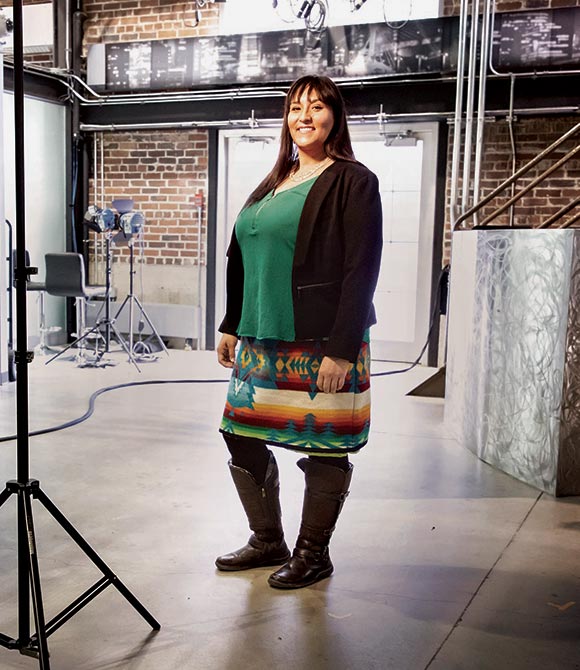
Kimmy Shade
AAAKAIKAAMODAKI – SURVIVES MANY CHALLENGES
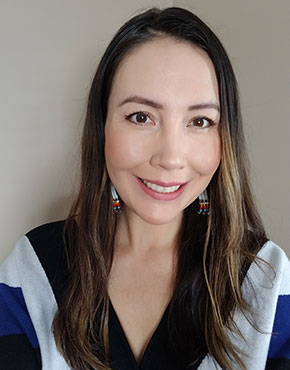 Kimmy Shade is a member of the Kainai First Nation, which is part of the Blackfoot Confederacy. She graduated from the college’s Business Administration program in 2001 and went on to earn a university degree in management. She now works as the climate leadership coordinator for the Blackfoot Confederacy tribal council.
Kimmy Shade is a member of the Kainai First Nation, which is part of the Blackfoot Confederacy. She graduated from the college’s Business Administration program in 2001 and went on to earn a university degree in management. She now works as the climate leadership coordinator for the Blackfoot Confederacy tribal council.
I have an amazing circle of strong family and friends who inspire me to challenge myself on the daily. My grandparents and parents are all extremely hard workers and have instilled a work ethic in me that is based on our Niitsitapi ways and always being helpful in any situation, while at the same time knowing when to ask for help.
That relates to the advice I would give to people just starting at the college. I would encourage them to get some strong mentors who they can relate to, pray, set good intentions for their school year and utilize student services to help them reach their academic goals. When I started at the college, I was a young mother and struggled financially. Christmas was coming and I saw a sign at the college offering Christmas hampers. I felt so reluctant to apply. I didn’t want anyone to know I was struggling. After arguing with myself for a good few minutes, I finally applied and when I received the hamper, I felt instant relief, gratitude and a sense of belonging with the college. I learned quickly how my pride can be a good thing and a bad thing all at the same time. Always ask for help, you’re not alone.
And as your start in your career, don’t get discouraged if you don’t find a job in the field you studied for. Try out different jobs for the experience – who knows where it will take you. Working with my own people has been such a gift – learning from our Blackfoot Elders, youth and technicians. And the older I get, the more connected I feel everything is. Working on environmental issues, you see the domino effect of one decision and the interconnection among things you never thought possible. The holistic-ness of everything is ever more present in every fibre of my being.
I’ve had the best of all worlds from my grandmothers, mother, aunties, sisters, daughter and friends. They all have influenced me in ways I never thought possible. I have so much admiration and love for all the dusting off and lifting up I’ve received from so many strong, resilient Indigenous women.
Janetta Soup
KANAH’SOYI – STAR SHINING BRIGHTLY
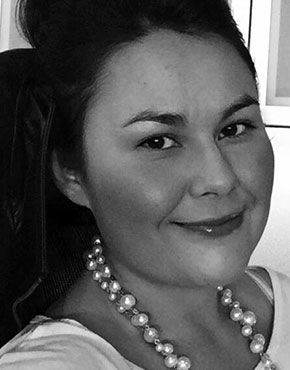 Janetta Soup is a member of the Kainai First Nation, which is part of the Blackfoot Confederacy. She graduated from the college’s Business Administration program in 2003 and earned a Bachelor of Management degree from the University of Lethbridge in 2007. She now works as a project coordinator for the cancer prevention and screening practices project at the Alberta First Nations Information Governance Centre.
Janetta Soup is a member of the Kainai First Nation, which is part of the Blackfoot Confederacy. She graduated from the college’s Business Administration program in 2003 and earned a Bachelor of Management degree from the University of Lethbridge in 2007. She now works as a project coordinator for the cancer prevention and screening practices project at the Alberta First Nations Information Governance Centre.
The role of grandmothers, their guidance, is prominent for most First Nations women. For Janetta Soup, a significant person in her life is her grandmother Clotilda Soup. The path of strength that Soup’s grandmother provides to her and her family is remarkable. “I recall her working hard, managing three jobs at once and still finding time to spend time with her grandchildren and going to play bingo,” Soup says. “Without her support, I would have struggled a lot more.”
From struggle, First Nations people have many stories of resilience and success. Soup’s current work involves advocating for First Nations people. Relationship building with the community is at the heart of her work, and integrating Niitsitapi values of reciprocity relative to the transfer of knowledge is important.
“I have learned from and witnessed the strength when Elders and traditional knowledge holders are involved (in the development) of protocols and best practices,” says Soup. “Advocating is more than an opportunity. I see it as a way of reciprocity, to strengthen our First Nations communities and honour our responsibility to the past, present and future generations.”
Connection to community is meaningful. In her time at Lethbridge College, Soup remembers how seeing a familiar face from home meant so much. “The connection kept me sane,” she says. Education has made a huge difference in her life, because “situations in life always change, but the lessons and teachings that you gain allow you to grow and make better decisions from day to day."
“The best advice that I can offer young women starting out in their education journey is to be kind, be strong, be courageous, be adventurous, be genuine and be safe. Trust your instincts and keep your attitude in check. Interesting fact I learned – add up the chronological placement of each letter in the alphabet – the word attitude equals 100 per cent.”
Roberta Smallbones
O-TAH-KOY-PI-KSSII I-PITT-AA – YELLOW FLYING BIRD
Roberta Smallbones is a member of the Piikani First Nation, which is part of the Blackfoot Confederacy. She is a 2000 graduate of Lethbridge College’s Criminal Justice program and went on to earn a Bachelor’s and a Master’s degree. She retired from a successful career in law enforcement and now teaches in the Justice Studies program at Lethbridge College.
I believe I got my strong work ethic from both my mom and dad. When I was 10, I started babysitting. I started in the work force when I was 13, cleaning rooms at a local hotel in Fort Macleod. I later got a job as gas attendant – or a “gas jockey” as they would say – and then started working in a laundromat. I think I got the zest for life from my mom. She always tried to be positive and treated people with dignity and respect no matter their background or walk of life.
I was on my own at a young age – 15. I had to learn to navigate the world on my own from what my parents taught me when I was younger. It was a huge learning curve. I entered a relationship at the age of 15 and became the victim of physical and psychological abuse at the hands of my partner. At the age of 18, I became a mom to my beautiful daughter, Sharissa.
After Sharissa was born, she became my hope and inspiration to create a better life for the both of us. I made a conscious decision that I was going to finish my high school education. After completing my GED, I continued to work at a clothing store in Fort Macleod and made my way up the ranks to assistant manager. It was during that time I decided that I wanted to go to college and get a business diploma. I made an appointment to meet with an academic advisor at Lethbridge College, and while I was waiting for my appointment, I remember flipping through a college program booklet and reading about the Criminal Justice program. By the time I met with my advisor, I had decided that I wanted to go into Criminal Justice.
It was during my time in the Criminal Justice program that a light finally turned on for me and I made the decision to get out of my abusive relationship. I knew that if I didn’t leave, my daughter and I would become another statistic. That year, I left my abusive partner. I was now a single mom, going to college and trying to make ends meet. The first semester was the most difficult but after I left my partner, the other semesters were a breeze. I had made some new friends who became my support system at college and my friends in Fort Macleod were my other support system.
In March 2002, I was hired as a constable with Lethbridge Police Service. I was the first Blackfoot Indigenous female from the Piikani Nation to be hired with LPS. I started my career in Patrols. I was also a school resource officer and my last position was as the FASD Youth Justice Officer. I met my current husband shortly after being hired, and we were married in 2004, becoming a blended family. In 2005, we had a daughter, Danika. In 2017, I took a leave of absence from LPS to be a full-time faculty member at Lethbridge College in the Justice Studies program, and I retired from policing in January this year to continue teaching.
As silly or twisted as it sounds, I think being in the abusive relationship helped me in many ways to grow as person. I wanted out and I was determined to make a better life for myself and my daughter. That was the end goal and we made it. There were definitely many obstacles and barriers and times that I wanted to give up but keeping my eye on the goal helped me get through.
I have had young Indigenous women say to me that I have inspired them to either finish their education or go into law enforcement. I know that I cannot change the world but if I can help at least one person, I think that is success. I have learned to be proud of who I am and proud to be an Indigenous person and where my family came from.
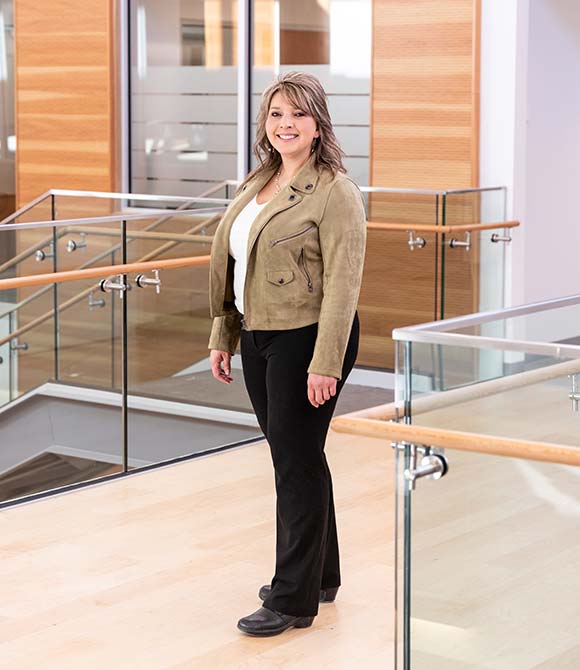
Nikki Soup
SII’PIAA’POWAHKAA – WALKS AT NIGHT
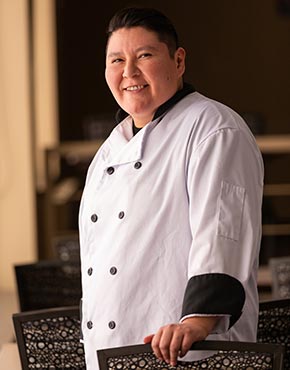 Nikki soup is a member of the kainai first nation, which is part of the blackfoot confederacy. She graduated from the college’s culinary arts program in 2015 and from its culinaryapprenticeship program in 2016, and currently owns her own catering business, souper foods and catering. She provided the “from our kitchens” recipe found online.
Nikki soup is a member of the kainai first nation, which is part of the blackfoot confederacy. She graduated from the college’s culinary arts program in 2015 and from its culinaryapprenticeship program in 2016, and currently owns her own catering business, souper foods and catering. She provided the “from our kitchens” recipe found online.
I recently had a loss in my family. He was a great man, an uncle of mine. I brought food to the family meeting. That’s what I do. I struggle a lot just like everyone else, but one thing I’m happy I can do is give people joy and bring them together with food. Through cooking, I found my passion. I’m a Red Seal Chef now. I remember when I met my wife and one day I bought food and made stew and bread. After that, I got to marry my best friend.
The majority of my kitchen time includes cooking for the Elders on my reserve and that’s where I really learned to work hard and always show respect through my food. I started a business in spring of 2018 and it’s still growing. It’s just a baby. I’m also learning and paying attention to my traditional food ways more. But I make sure to discover all types of foods and cultures. I find it funny, because when my dad was still alive, I’d be going through something and he’d tell me to cook. I wouldn’t be in the mood, but I would, even if it just meant for suppertime with him, my mom and my two little sisters. I remember I would always feel good after they ate.
Now I find myself, when I’m going through something in life, whether it be bad or good, I’m cooking. I’m preparing a meal. I’m shopping for food for my family. I’m prepping for a funeral or I’m planning a wedding menu. I’ve made so many friends and have gone to places I never thought I would have if it weren’t for cooking.
I had a dream to be the best cook I can be. I’m not. But with every meal I gain more patience, more knowledge and more love for what I do. I hope that many more will find something to do or a dream that they can fall in love with – that wonderful, hard and “it-was-all- worth-it” type of love.
Roxy Weaselhead
NAATOO KOOH KOMII – WOMAN WHO CALLS TWICE
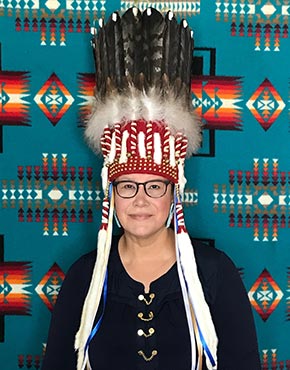 Roxyweasel head is a member of the kainai first nation, which is part of the blackfoot confederacy. She graduated from the college’s general studies program in 2003 and earned her teaching degree from the university of lethbridge in 2009. She now works as a teacher at saipoyi community school in standoff.
Roxyweasel head is a member of the kainai first nation, which is part of the blackfoot confederacy. She graduated from the college’s general studies program in 2003 and earned her teaching degree from the university of lethbridge in 2009. She now works as a teacher at saipoyi community school in standoff.
Oki. Nistoo Aniikook Naatoo Kooh Komii. My Blackfoot name is “Woman who Calls Twice,” better known to my family and friends as Roxy Weasel Head. I have been happily married to my amazing husband Lionel for 23 years, although we have been together for 28 years. I have five beautiful daughters: Brittany, Mercedes, Keely, Madison and Layla, and an adorable sweet grandson Holden Finnley. We are a very busy family!
I owe my traditional teachings to my parents Andrew and Margaret Weasel Fat. They are spiritual role models for our community. They instilled the importance of language, learning our history, and practising our ceremonies.
I attended Lethbridge College and graduated in 2003 with a General Studies diploma. In my last semester at college, I took a work experience course and was placed at a head start program, working with young children ages three to five. This is when I decided I wanted to become a teacher. I love spending time with children. I wanted to help in shaping the person they will become and I love learning.
I have been an educator for 10 years. I love my job and the students. I believe in teaching our youth about the importance of knowing who you are and where you come from. I invite Elders into our class to help with these teachings. To know or have an identity, we must know our history and language through stories, ceremony and prayer. Land-based teaching is one way to teach our youth, visiting local sites, knowing its history – picking berries, sweet grass or sweet pine.
I treat the students the way I was brought up: to respect themselves and others. An Elder once said: "People are always watching. Carry yourself with pride, not arrogance." Teachers are held to a higher standard, and I live my life this way. As a woman, teacher and spiritual leader in our community, I carry on our traditions, knowledge and teachings for the next generation.
To know or have an identity, we must know our history and language through stories, ceremony and prayer.
Joyce Marie Healy
US SAN GAH GEE – ALWAYS SINGING WOMAN
Joyce healy is a member of the Kainai First Nation, which is part of the Blackfoot Confederacy. She teaches Blackfoot language and introduction to native studies at Lethbridge College.
My first ugly experience with language was at the residential school at St. Mary’s [on the Blood Reserve]. I was called down to what we called “the parlour.” Two women who worked there came in. One of them asked me in Blackfoot what I was doing in the parlour. I just kept looking at them. She repeated again in Blackfoot. I just shook my head. Even if they were my own people, I wasn’t going to jeopardize anything by speaking Blackfoot. I said in English, “I don’t know what you’re saying.” They laughed... I had to lie about my own language, not speaking it, not understanding it.
I cried the whole time at the boarding school. My way of resisting was just through crying. My grandmother and parents had some pull and were able to get me out of the residential school to a school in Cardston. It was almost a schizophrenic experience, really. We’d have our normal Blackfoot existence in my Grandma’s little one-room cabin in Moses Lake across the highway from the Mormon town of Cardston. Before the sun rose, my grandmother would have the fire stoked up in the wood stove. I woke up to the smell of sweet grass and sage and wood smoke. We’d start our day with prayers in Blackfoot.
Then, the moment I crossed that highway, I was going into a different world. They were modernizing. They had running water and electricity. The moment that road was crossed, I became a different Joyce Healy. I went to school, the only native in the class, and classmates started to notice the differences. The smells that I emanated were considered stinky. And, I couldn’t speak English, so I was dumb. That was my second horrible experience with language.
Language is how we express our true selves. It’s about identity. Language articulates the belief system, principles, world view of peoples. If you don’t understand who you are, then you’re not ever going to be whole. There is going to be part of you that’s missing. Blackfoot was always a spoken language. Our history was oral history, stories told from one generation to another for thousands of years. The Sikatsitapi (Blackfoot People) genesis and history from the beginning of time has been passed from one generation to the next generation. Our beginnings in this universe, our way of life, our history, our culture. That’s how I teach the language, the oral history of my people, you cannot teach language without context. I teach the language phonetically. It’s recognizing the sound of words, and sounding them out. Having your language to speak your story validates your existence as Niitsitapi, the real people. It’s the language that connects me to culture and history from the Niitsitapi, Blackfoot perspective. Of all the things I have done in my life, teaching Blackfoot and sharing the culture is at the top of my list. That’s for me, my identity. That’s for me to be able to express myself in an adequate way, to express who I am and to get to know who I am. The language made me whole.
